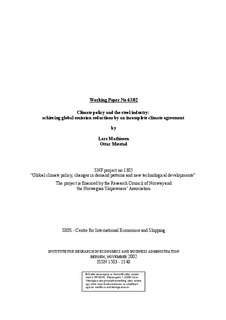| dc.description.abstract | The steel industry is one of the largest sources of global CO2 emissions and hence a candidate for climate policies. A carbon tax on emissions in industrialized countries, however, will cause relocation of steel production to non-industrialized countries, and because of their relatively high emission intensities the effect on total emissions is ambiguous. Using a partial equilibrium model of the steel industry, this paper finds that global emissions from this industry are likely to decline substantially. This is primarily due to factor substitution within the integrated steel mills in the industrialized countries. Such effects are not well accounted for in economy wide models, which typically lump individual industries into aggregates. Furthermore, it is shown that border taxes on steel products are potentially useful instruments for achieving a given reduction in global emissions with less restructuring of domestic steel industry in the industrialized countries. | en |
